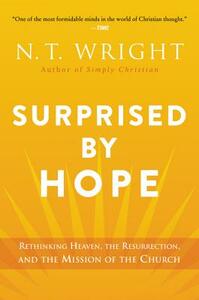Take a photo of a barcode or cover
165 reviews for:
Surprised by Hope: Rethinking Heaven, the Resurrection, and the Mission of the Church
N.T. Wright
165 reviews for:
Surprised by Hope: Rethinking Heaven, the Resurrection, and the Mission of the Church
N.T. Wright
challenging
hopeful
informative
inspiring
reflective
medium-paced
I enjoyed the logic behind Wright's thinking and the carefully laid path that he provides to explain his conclusions. Wright provides some good food for thought as we consider the mission of the church in today's world.
challenging
informative
medium-paced
amazing (though admittedly somewhat dry at times) and revelatory. looking at Christianity in what I honestly feel is the true context , explaining why the resurrection and the kingdom on earth now is exactly what it all means. Those passages / events I've read over and over and scratched my head, muttering "but what about this part?" all make sense in this new light. not to elevate Mr. Wright to the level of Jesus, but reading this I feel like one of the two travelers to amaus (however it's spelled) suddenly hearing how all of the past events fit into the scriptures. Can't recommend this more, but again it's pretty heavy doctrine and language wise, but if you consider yourself a 'seasoned' Christian, you need to read this.
hopeful
informative
reflective
slow-paced
challenging
hopeful
inspiring
reflective
slow-paced
inspiring
reflective
slow-paced
hopeful
reflective
slow-paced
challenging
hopeful
informative
medium-paced
hopeful
inspiring





